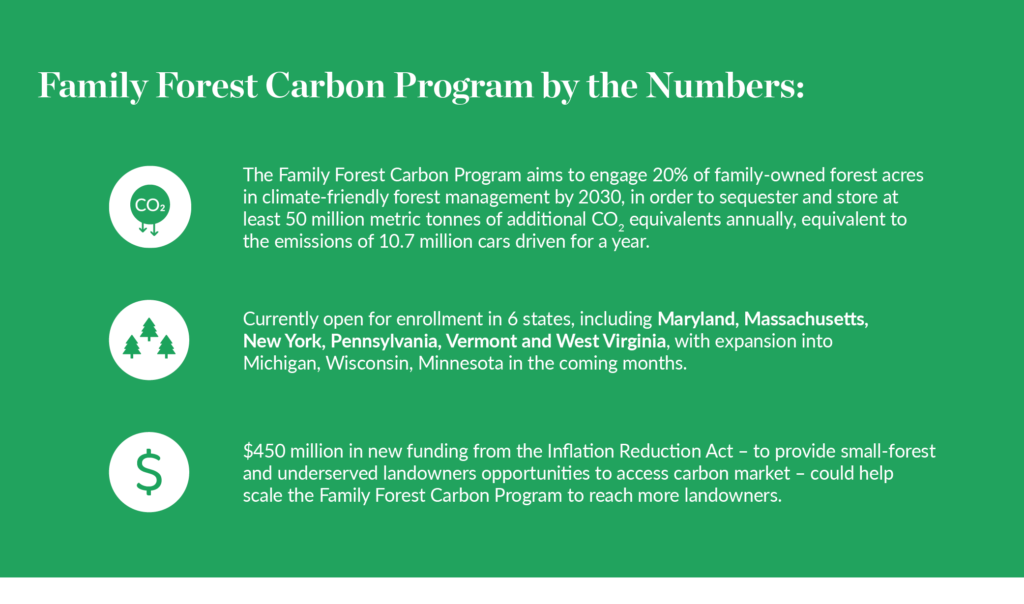Last updated on January 25th, 2024

Our family has always shared a mutual love of the outdoors. When we purchased an old 187-acre farm on a wooded property in 2020, little did I know that it would ignite a journey of forest stewardship.
My dad wanted to plant and sell Christmas trees and start a vineyard, and my mom wanted to try her hand at maple syrup. Being close to my parents and the property gave me the opportunity to jump in feet first as a co-owner in this operation.
But starting an agri-business takes more than aspirations. It takes upfront investment and technical assistance – two perks we found in the Family Forest Carbon Program.
We got into forest management by carving out trails and cutting fire breaks, but our knowledge of forestry was introductory at best. So, we reached out to the Maryland Department of Natural Resources and connected with a forester who helped us verbalize our visions for the property and craft a forest management plan. I was proud to be a part of this exercise. My family cares about being good stewards, supporting wildlife, and we want our property to be something that contributes to a larger cause like climate change.

Over the next two years, we planted 600 Christmas trees and nearly 500 grapevines for wine in a 30-acre field. Our goal is to plant Christmas trees that can be harvested once every eight years and to tend to about 1,500 grapevines, in addition to producing maple syrup from our forests. But we are just getting started.
An agri-business like this needs upfront cash with delayed revenue streams, even as we were maintaining and expanding our projects on the property. We needed to explore other ways to generate revenue that we could use to put into the land. Our forester told us about the Family Forest Carbon Program. The Program is a carbon program uniquely designed for owners of small, forested properties. It was developed and is being implemented by the American Forest Foundation (AFF) and The Nature Conservancy (TNC).
The Family Forest Carbon Program addresses climate change by supporting landowners in caring for their forests to make them healthier and more productive. Landowners receive annual payments to implement forest practices that increase the amount of carbon sequestered and stored in the trees. These practices also create needed habitat for bird and wildlife species. Participants can still conduct harvests, as long as they are in line with sustainable harvesting requirements. The program also offers a chance for participants to connect with a forester and other resources needed to adopt long-term sustainable management.

We were impressed with the program’s dedication to integrity. AFF and TNC have created an innovative new carbon accounting methodology, that is approved by Verra’s Verified Carbon Standard. This new methodology aims to enhance accuracy and transparency to ensure the program is providing a true climate benefit.
We decided to enroll. Our agri-business is not just about the vineyard – it’s about being good stewards of the land and conservation. I hope more landowners are able to connect with market-based opportunities like this that help them fulfill their personal goals too.
The Family Forest Carbon Program is in the process of scaling to more states. The Program has established itself in Pennsylvania, West Virginia and Maryland, enrolling more than 220 small forest holders, who collectively own more than 35,000 acres. Thanks to recent funding from the Inflation Reduction Act, carbon markets for small forest holders are getting a jumpstart, but they will need more partners and backers like the state of Maryland and continued support from the federal government to bring the program to landowners.

As a technology consultant, I think about owning land as a business. Caring for our forests and making them healthier requires investments in time and money, but they are also investments in our planet. The benefits forests produce – clean water, habitat, carbon sequestration and storage –are larger public benefits. Our small piece of nature is incredibly valuable to us, but even more so when one considers the difference we can make from our corner of the world. I hope other citizens and our leaders see opportunities like this and continue to expand the options available to unlock what’s possible across our private forestlands.

For more information on the Family Forest Carbon Program, visit familyforestcarbon.org.
